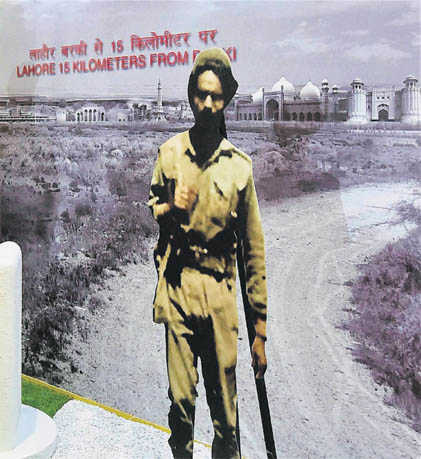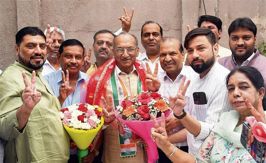
KC Singh
September this year has been remarkable for numerous reasons. India marked the Golden Jubilee of the 1965 India-Pakistan war, which ended at midnight September 22/23 in a UN-brokered cease-fire. Prime Minister Modi left on September 22 on a six-day foreign tour that took him to Ireland and New York on the 70th anniversary of the UN, founded on June 26, 1945. The PM then headed to the Silicon Valley in California - an economic and technology power house, having a GDP of over $2.4 trillion, out-ranking India. It is also where Indian immigration commenced, the first Sikh settlers arriving in 1899. All three have relevance for Punjab.
The 1965 India-Pakistan war's 50th anniversary compelled the nation to pause and remember the martyrs, though perhaps not its strategic significance. Two events in Delhi need recounting. A former Chief Minister, Capt Amarinder Singh, Aide de Camp to Lt Gen Harbakhsh Singh, the then Army Commander for the Western Command, released his book "The Monsoon War", co-authored by Lt Gen T. Shergill. A glossy volume, it is an authoritative account of major battles and operations supported by maps. Two days later, a function was held at the Sri Teg Bahadur Khalsa College, chaired by Union minister Harsimrat K. Badal, in the absence of her husband, Deputy Chief Minister Sukhbir S. Badal. Gen J.J. Singh, a former Army Chief, was the chief guest and I delivered the keynote speech. To my knowledge, no function of equal prominence was held in Punjab, though the war was critical to the fate of Punjab, as indeed India.
The 1965 war was the last credible opportunity for Pakistan to alter the status quo in Kashmir by force. While India was demoralised post 1962 drubbing by China and slowly re-equipping its army, Pakistan having convinced the US of its utility as an ally against communism, had been generously armed by the US with latest weapons since 1954. Also since the theft of Prophet Muhammad's hair in Srinagar in December 1963, the valley had been in turmoil. Sheikh Abdullah was released from house arrest in April, 1964, and allowed to travel to Pakistan on a peace mission. While driving to Muzaffarabad in occupied Kashmir he heard of PM J. Nehru's demise on May 27, 1964. Lal Bahadur Shastri succeeded Nehru but few even in India thought he filled the vacated shoes.
In April, 1965, Pakistan tested its new weaponry and firepower in a limited fight in Kutch that soon ended in a cease-fire. In May 1965 Sheikh Abdullah was re-arrested when he met Chinese Premier Zhou Enlai. The valley was again disturbed. Meanwhile, US President Lyndon Johnson began to deepen military commitment in Vietnam, commencing US embroilment. President Ayub Khan, instead of assisting the US, as demanded by the US in view of their alliance, visited Beijing and Moscow in the summer of 1965. Pakistan had finalised Operation Gibraltar, so named after the entry point of the Moorish invasion of Europe in 711, to induct a mix of soldiers in civvies, tribesmen and volunteers, numbering around 3000 into the valley for sabotage and inciting insurrection. Even BBC reported on August 25 that such an operation was underway.
The plan was brilliant, but rested on three false assumptions. The first was that India lacked a decisive political leadership. The next that the Indian Army was equipped with Second World War weapons and still demoralised after the Sino-Indian war and thus would collapse. Finally, it was assumed that the Kashmir valley would rise in revolt. India, on discovering the seriousness of the incursions, attacked Pakistani posts commanding access to the valley. Once India captured the Haji Pir Pass on August 29, signalling the collapse of Operation Gibraltar, Pakistan on September 1 in desperation commenced an actual military attack called Operation Grand Slam in the Jammu sector to capture Akhnoor, thereby cutting off Indian access to the valley. There were hours when the outgunned Indian troops were on their last legs. But PM Shastri showed mettle, allowing the Army to counter-attack across the international border with a pincer move on Kasur, Lahore and Sialkot on Septmber 6. The war had come to Punjab.
The inflexion point for Punjab was when the Army Chief in panic, seeing Pakistan's superior and massed armour, asked Lt Gen Harbakhsh Singh to withdraw behind the Beas river, which he refused merely on oral instructions. By next morning the same armour had been trapped and decimated. Why the role of Punjab, where villagers provided moral and material support to the Army, has not been adequately highlighted in saving the nation is a pity.
Turning to PM Modi's attendance of the UN Special Session on Sustainable Development on Sept 25-26, there are 17 goals for achievement by 2030, which follow the eight Millennium Development Goals (MDGs) of 2000, for which the deadline ended this year. Fast-growing economies, particularly of the emerging nations, allowed many MDGs met in time or earlier. For instance, extreme poverty, calculated as income of $1.25 per day, was cut five years early. Others like diminishing female mortality were met 75 per cent.
The new 17 sustainable development goals (SDGs) are more diverse but relevant for Punjab i.e. at number 15 is sustainable use of land. Punjab today faces a dropping water table in some areas and water-logging in others, increased use of fertilisers, pesticides and herbicides degrading the quality of water and crops like paddy, making water resources unsustainable. Punjab as India's bread basket must lead, not merely as a producer but a pioneer of sustainable practices. The Israeli Ambassador told me about a low water requiring rice variety under development. Similarly, while the Silicon Valley is important as a technology partner, Punjab needs the California model of sustainable and high-yield fruit, grape and nuts-based agro-industry. It is a pity PM Modi did not carry an agro-industry team with him or visit Yuba City, the Mecca of Punjabi farmers in that state.
The 1965 war re-confirmed Punjab as the sword arm of India, which decades of Khalistani militancy subsequently sullied. Similarly Punjab, though still India's granary, is stuck with an unsustainable agricultural model that is destroying its aquifers and impoverishing its peasantry. Only when elections are fought and won on such issues will real change be ushered, hopefully before the UN mandated 2030.
— The writer is a former Secretary, MEA



























